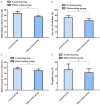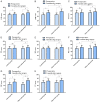High-quality nursing can reduce the incidence of adverse events in esophageal cancer patients after operation in the intensive care unit and improve postoperative rehabilitation
- PMID: 34786114
- PMCID: PMC8581859
High-quality nursing can reduce the incidence of adverse events in esophageal cancer patients after operation in the intensive care unit and improve postoperative rehabilitation
Abstract
Objective: This research aimed at observing the effect of applying high-quality nursing in the intensive care unit (ICU) to esophageal cancer (EC) patients after radical resection.
Methods: From January 2015 to February 2020, 155 EC patients who underwent radical resection were divided into the control group (CG; n=77) and the observation group (OG; n=78). The CG was given conventional nursing intervention, and the OG was given high-quality nursing intervention. The scores of the visual analogue scale (VAS), clinical related indexes, complications, self-rating anxiety scale (SAS), self-rating depression scale (SDS), nursing satisfaction and SF-36 of patients were compared.
Results: After nursing, compared with the CG, the duration of the indwelling drainage tube, time to getting out of bed, recovery of bowel sounds and hospitalization in the OG was shorter, and the incidence of postoperative complications was less. In addition, after nursing, the VAS, SAS and SDS scores of patients in both groups decreased, and these indexes in the OG decreased more than those in the CG. Patients were investigated upon discharge, and it was revealed that the nursing satisfaction of patients in the OG was obviously better than that in the CG. Three months after the operation, the scores of general health (GH), mental health (MH), role-physical (RP), role emotional (RE) and vitality (VT) of patients in the OG were higher than those in the CG.
Conclusion: High-quality nursing exerts a better effect in the ICU for patients who underwent EC surgery; it can reduce pain and adverse events and promote rehabilitation.
Keywords: Esophageal cancer; high-quality nursing; intensive care unit; operation.
AJTR Copyright © 2021.
Conflict of interest statement
None.
Figures




Similar articles
-
Specific nursing improves postoperative urine control function and the self-efficacy of patients undergoing radical prostatectomies.Am J Transl Res. 2022 Mar 15;14(3):1695-1704. eCollection 2022. Am J Transl Res. 2022. PMID: 35422910 Free PMC article.
-
Effect of rapid rehabilitation nursing on inflammation and liver function after laparoscopic radical resection of primary liver cancer.Am J Transl Res. 2022 Nov 15;14(11):8156-8165. eCollection 2022. Am J Transl Res. 2022. PMID: 36505328 Free PMC article.
-
Effects of high-quality nursing intervention on negative emotions, postoperative complications and gastrointestinal function in patients with gastric cancer surgery.Am J Transl Res. 2022 Mar 15;14(3):1652-1662. eCollection 2022. Am J Transl Res. 2022. PMID: 35422953 Free PMC article.
-
Effect of rapid rehabilitation nursing on improvement of quality of life after super-miniPCNL and risk analysis for postoperative complications.Am J Transl Res. 2022 Jul 15;14(7):5146-5154. eCollection 2022. Am J Transl Res. 2022. PMID: 35958457 Free PMC article.
-
Effectiveness of Continuous Care Interventions in Elderly Patients with High-Risk Pressure Ulcers and Impact on Patients' Activities of Daily Living.Altern Ther Health Med. 2024 Mar;30(3):118-123. Altern Ther Health Med. 2024. PMID: 37883751
Cited by
-
Effect of high-quality nursing interventions on the quality of life and cardiac index in acute coronary syndrome patients treated with drug-eluting stents: a randomized trial study.BMC Nurs. 2025 Jan 15;24(1):51. doi: 10.1186/s12912-025-02710-z. BMC Nurs. 2025. PMID: 39815311 Free PMC article.
-
Managements for perioperative anxiety in patients with gastrointestinal cancers.Front Psychiatry. 2024 Oct 21;15:1391403. doi: 10.3389/fpsyt.2024.1391403. eCollection 2024. Front Psychiatry. 2024. PMID: 39497898 Free PMC article. Review.
-
Effect of quality nursing care on wound pain and anxiety in burn patients: A meta-analysis.Int Wound J. 2024 Apr;21(4):e14798. doi: 10.1111/iwj.14798. Int Wound J. 2024. Retraction in: Int Wound J. 2025 Apr;22(4):e70450. doi: 10.1111/iwj.70450. PMID: 38572761 Free PMC article. Retracted.
-
Improving Nursing Care Models is Beneficial for the Perioperative Phase for Esophageal Cancer Patients.J Multidiscip Healthc. 2025 Mar 26;18:1771-1778. doi: 10.2147/JMDH.S500611. eCollection 2025. J Multidiscip Healthc. 2025. PMID: 40160536 Free PMC article.
-
Efficacy of High-Quality Nursing Service for the Patients during the Anesthesia Recovery Period: A Meta-Analysis.Appl Bionics Biomech. 2022 Aug 8;2022:3528915. doi: 10.1155/2022/3528915. eCollection 2022. Appl Bionics Biomech. 2022. Retraction in: Appl Bionics Biomech. 2024 Jan 24;2024:9797504. doi: 10.1155/2024/9797504. PMID: 35979241 Free PMC article. Retracted.
References
-
- Mariette C, Markar SR, Dabakuyo-Yonli TS, Meunier B, Pezet D, Collet D, D’Journo XB, Brigand C, Perniceni T, Carrère N, Mabrut JY, Msika S, Peschaud F, Prudhomme M, Bonnetain F, Piessen G Fédération de Recherche en Chirurgie (FRENCH) and French Eso-Gastric Tumors (FREGAT) Working Group. Hybrid minimally invasive esophagectomy for esophageal cancer. N Engl J Med. 2019;380:152–162. - PubMed
-
- Wang X, Li X, Cheng H, Zhang B, Zhong H, Wang R, Zhong B, Cao Q. Single-port inflatable mediastinoscopy combined with laparoscopic-assisted small incision surgery for radical esophagectomy is an effective and safe treatment for esophageal cancer. J Gastrointest Surg. 2019;23:1533–1540. - PubMed
LinkOut - more resources
Full Text Sources
Miscellaneous
